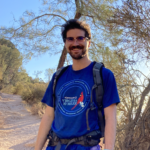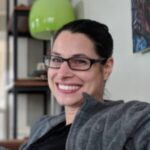We will be presenting several strands of work at the upcoming 2024 Annual Meeting of the American Educational Research Conference in Philadelphia. This year, much of our work has focused on teachers’ and teacher educators’ perception and uptake of more socially-aware approaches data literacy education. We have also continued to develop our line of research around data and STEM literacies with teachers of the visually impaired, and youth-generated digital storytelling.
Papers
Wilkerson, M. H, Kim, J., Stokes, D. J, Ferrell, M., & Lee, H. S. (Forthcoming 2024). Heuristics for Sociocritical Engagement with Data Artifacts: Why, When, and How Might Teachers Use Them? Full paper.
Abstract. A number of heuristics have been developed to support learners and educators in engaging not only the mathematical but also the social, ethical, and critical dimensions of data. Still little is known, however, about how teachers envision these heuristics fitting within the curriculum. In this proposal, we ask: What do teachers themselves attend to as key aspects of data when engaging with HSED? and, For what purposes do teachers envision leveraging HSEDs in their classrooms? Drawing from interviews with secondary school teachers with a variety of backgrounds, student populations, and identities, we highlight emerging themes and tensions in how teachers conceptualize these tools.
Foley, E. & Wilkerson, M. H. (Forthcoming 2024). Classroom Accessibility as a Sociotechnical System: The Case of Data Visualization Literacy. Roundtable paper.
Abstract. Increasingly, data about the world is communicated visually through maps, graphs, and diagrams. Advances in technology have also increased the accessibility of such visual information for blind and low-vision (BLV) populations. However, most such efforts lack sufficient attention to the broader sociotechnical systems—interactions between educators, students, tools, curricula, and meaning-making practices—that BLV students navigate as they learn to access and interpret certain visual content. Drawing from the Visual Impairments Field and the Learning Sciences, we propose a framework to systematically consider how data visualization literacy might be supported for BLV students across a variety of accessibility tools, visualization types, and student-instructor interactions. This framework repositions technological tools alongside general education and specialist teachers, data reasoning practices, and student agency.
Symposium Contributions
Wilkerson, M. H., Shah, Z., & Barton, J. C. (Forthcoming 2024) The Purpose and Promise of Critical Data Activities through the Eyes of Teacher Educators. In the symposium Exploring Critical Data Literacy in K-12 Social Studies.
Abstract. Here we report on the design and implementation of a summer 2023 workshop for teacher educators (TEs) who we supported in incorporating critical, computational data explorations into their planned coursework for pre-service teachers. The workshop was part of CUNY’s Computing Integrated Teacher Education program, a multi-campus effort to introduce culturally-sustaining forms of computing into teacher education programs in a large metropolitan area. We ask: (1) Where do teacher educators (TEs), including those for whom data is not already a major component of their courses, see it fit to incorporate data investigations for future K12 teachers? And, (2) What types of data engagements do these educators see as important or useful for the future teachers with whom they work?
Wilkerson, M. H. & Roberto, C. (Forthcoming 2024). Dreams and Contestations: Minoritized Youths’ Redefinitions of Computing. In the symposium The Role of Emergent Technologies in Equitable Futures: Navigating Between Entrenched Injustices and Expansive Possibilities.
Abstract. Computing education often attends to the ways advances in computing impact what young people ought to learn. As this symposium makes clear, it is equally important to examine the ways in which young people come to understand and question the field of computing and the ways in which it is used. This yields the question: Under what conditions are youth supported to dream about the purposes of computing within computing education contexts? We focus on two instances across different projects in which participants challenged and worked to redefine core concepts that underpinned our computing education research.





